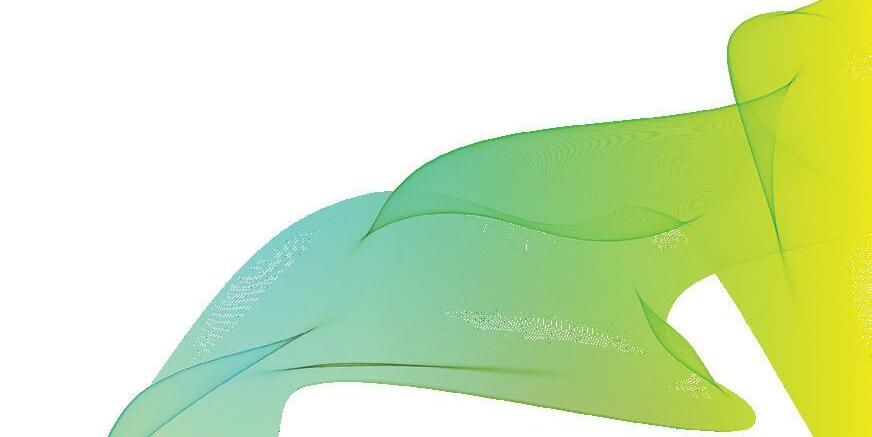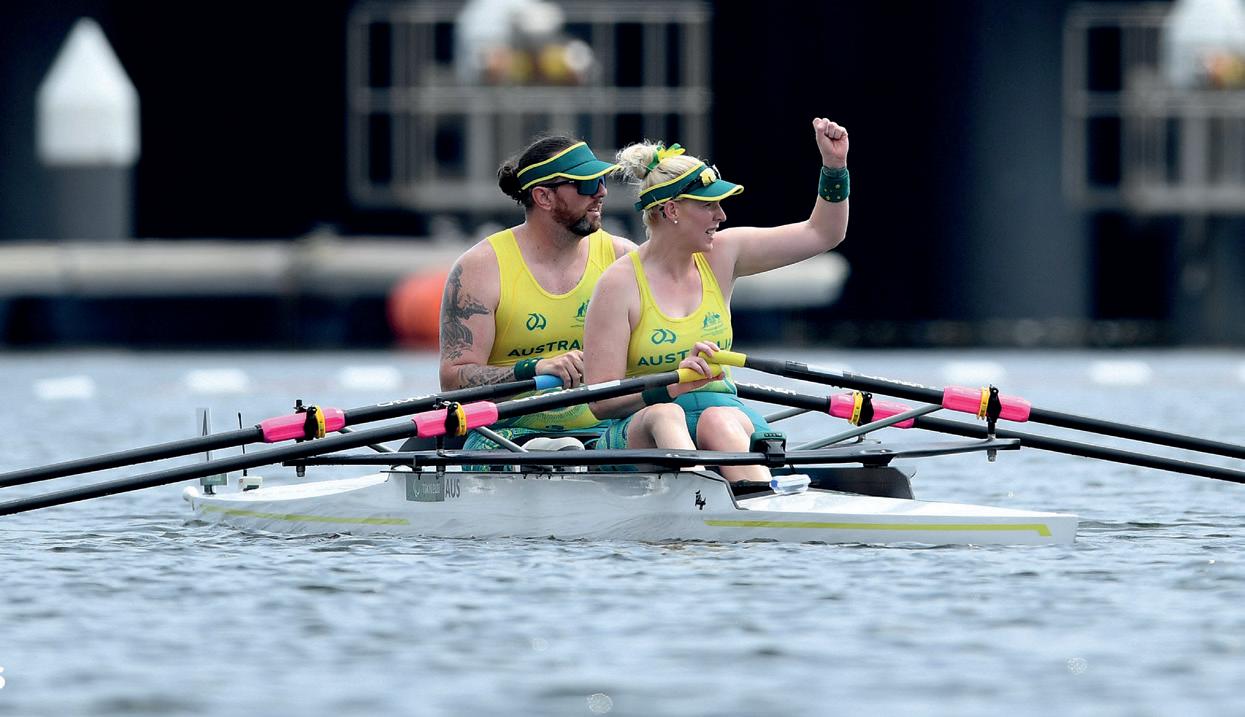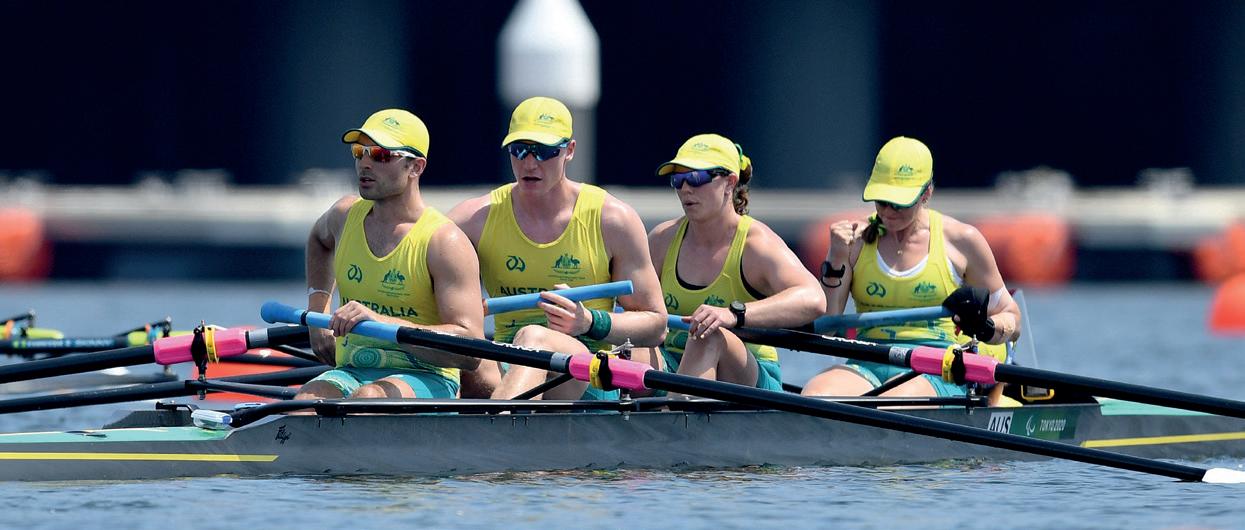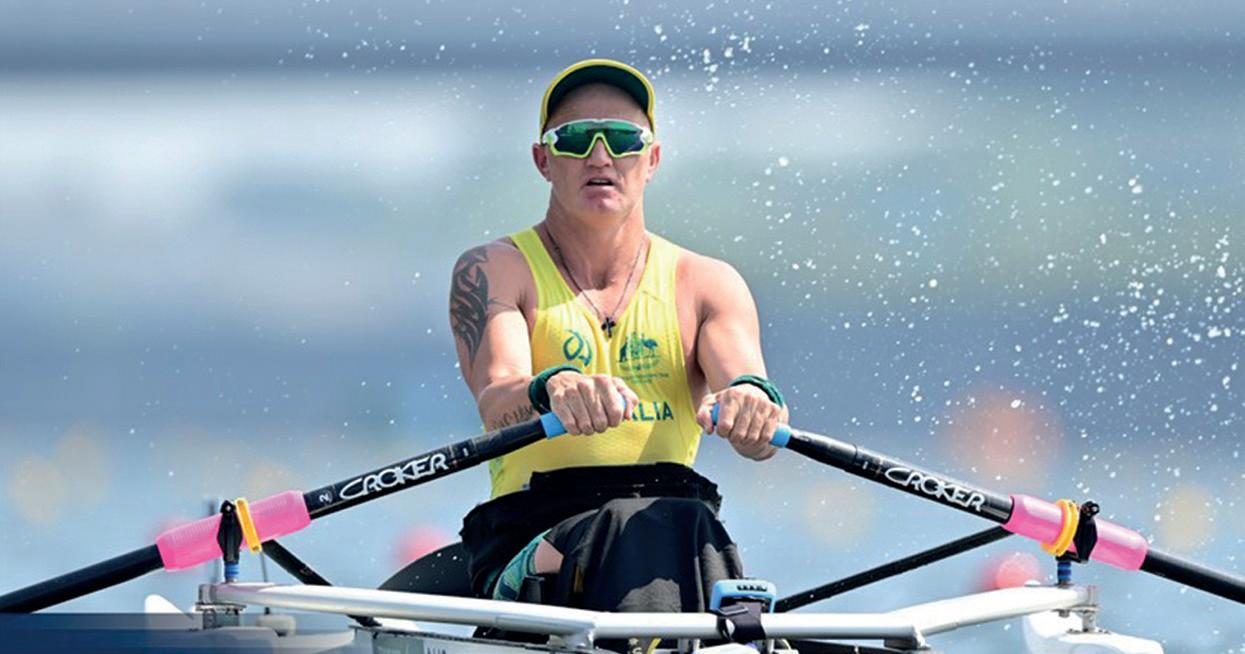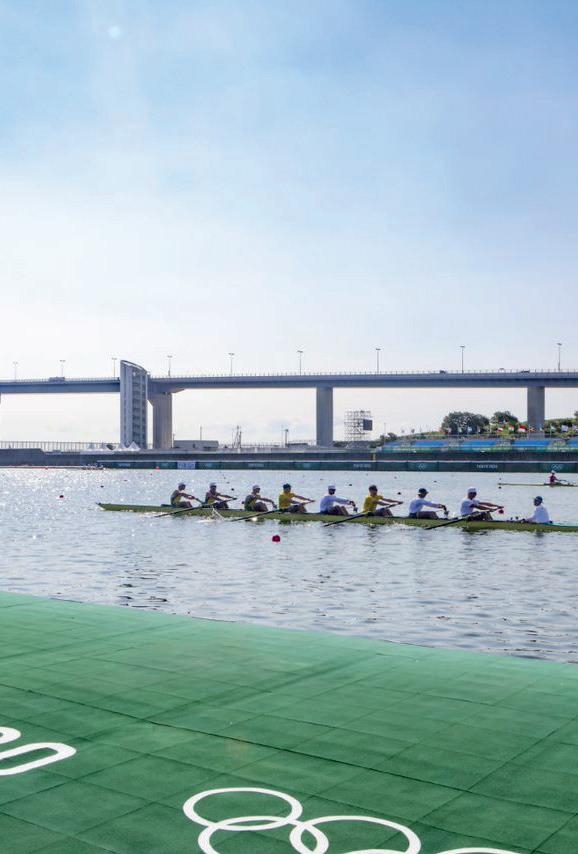
9 minute read
Tokyo 2020 Key Results
MEN’S COXLESS FOUR - GOLD
Alex Hill OAM, Spencer Turrin OAM, Jack Hargreaves OAM
Advertisement
and Alex Purnell OAM took to the water in their heat looking to secure a top two finish in order to progress directly to the A-Final. Having drawn in lane one, the crew faced Romania, Netherlands, South Africa and USA in prime position to win their heat. The crew dominated the race from the start, quickly finding a good rhythm, working hard to secure a two second lead by the halfway mark. The Australians finished first in their heat ahead of USA and the Netherlands. In the Final, the crew led by 1.62 seconds with 500-metres to go and held on to win by just 0.37 of a second, in an Olympic best time of 5 minutes 42.76 seconds from Romania and Italy.
WOMEN’S COXLESS FOUR - GOLD
Annabelle McIntyre OAM, Jessica Morrison OAM, Rosie Popa
OAM and Lucy Stephan OAM were the favourites in their heat. With their biggest rivals the Dutch crew in the previous heat, the Australians dominated their race from the outset against a strong field of Ireland, Romania, USA and Denmark. The crew maintained their form through the full length of the course, coming in first to progress to the A-Final. Racing out of lane three in the Final, the crew held off a fastfinishing Dutch team to win the Gold Medal in an Olympic best time of 6 minutes 15.37 secs. The winning margin between Australia and Silver Medallists Netherlands was just 0.34 of a second.
MEN’S QUAD SCULL - BRONZE
The Men’s Quadruple Scull of Jack Cleary, Caleb Antill, Cameron Girdlestone and Luke Letcher needed a top two finish in their heat to progress to the Final and avoid a repechage. The Australians took on China, Great Britain, Lithuania and The Netherlands, with the latter the reigning World Champions. It was the Dutch who took the early lead, leaving Australia, China and Great Britain to battle for second place. The Australians pulled ahead of the pack in a bid to chase down the Dutch, and rating 42 in the final throws of the race, they took the second and qualified for the Final. Facing the Netherlands, Great Britain, Italy, Poland and Estonia, the Aussies fought hard throughout the race and fought back in the second half of the course to take the Bronze behind the Dutch and British crews.
WOMEN’S QUAD SCULL - BRONZE
The Women’s Quadruple Scull qualified their boat late for the Games, by virtue of winning the Final Olympic Qualification Regatta. In their first heat, the debutants of Ria Thompson, Rowena Meredith, Harriet Hudson and Caitlin Cronin required a top two finish, but faced tough opposition from China, Poland, Italy and France. A fourth position finish forced them into the repechage. Drawn in lane two, the crew took on USA, Italy, Great Britain and New Zealand in a tough race that required a top two finish to progress to the A-Final. The Olympic debutants crossed the line first and booked their position in the Olympic final. In the Final, China and Poland established a strong lead ahead of the field. The Aussies maintained fifth position for the first 1500-metres, it was their composure and boat speed in tough conditions that pushed them through to take the Bronze, ahead of crews from Italy, Germany and the Netherlands.

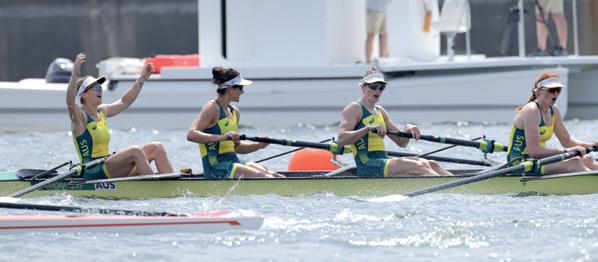
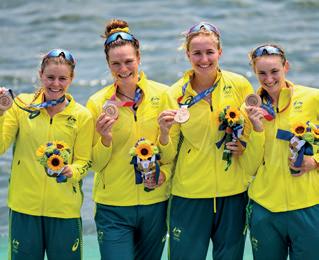

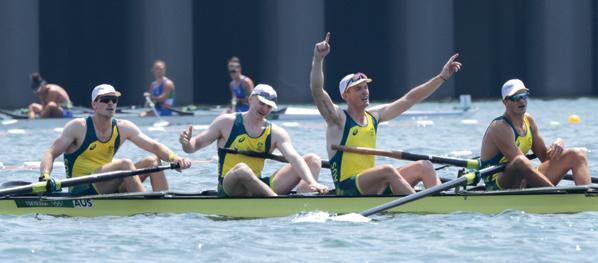
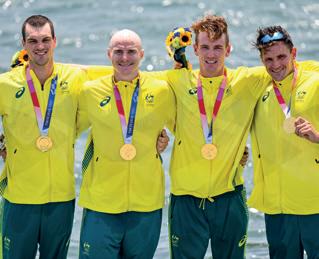
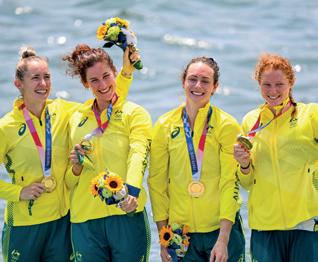

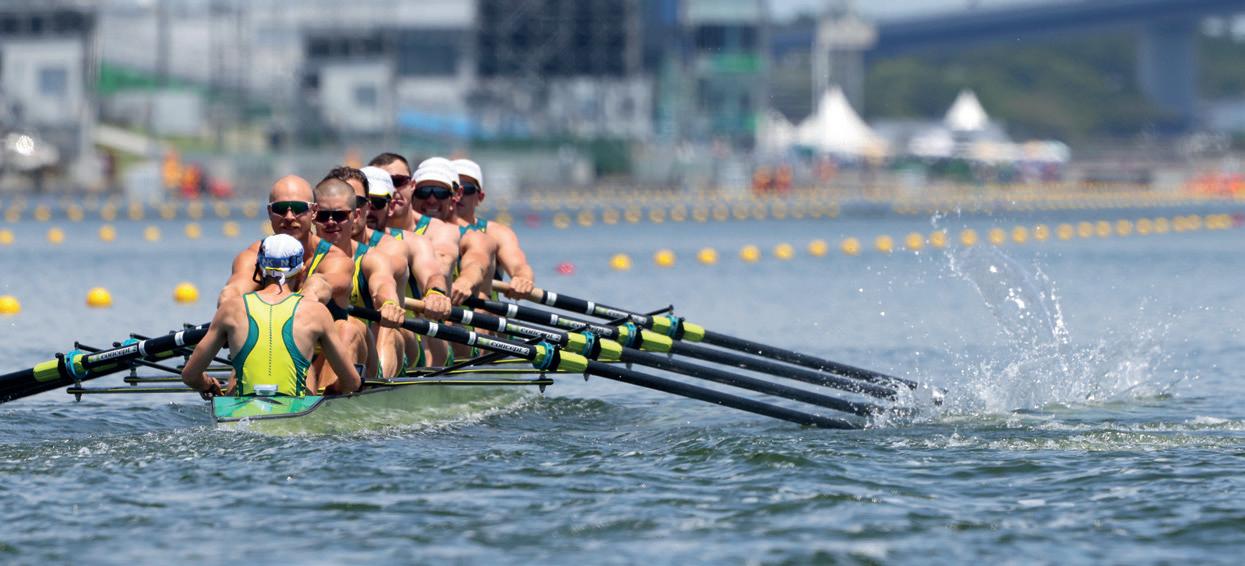
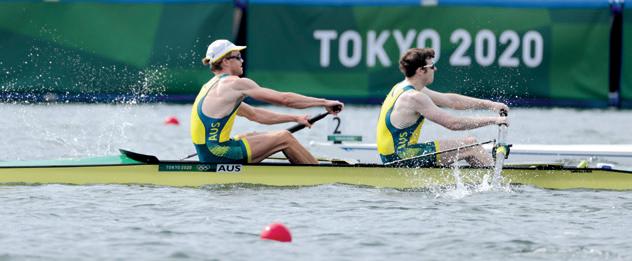
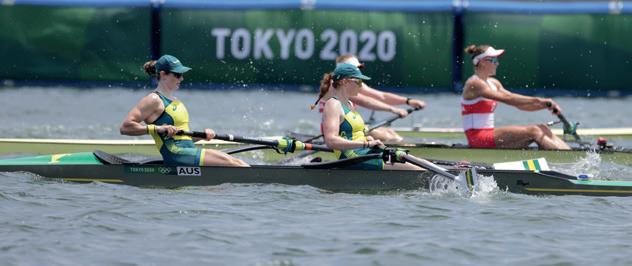
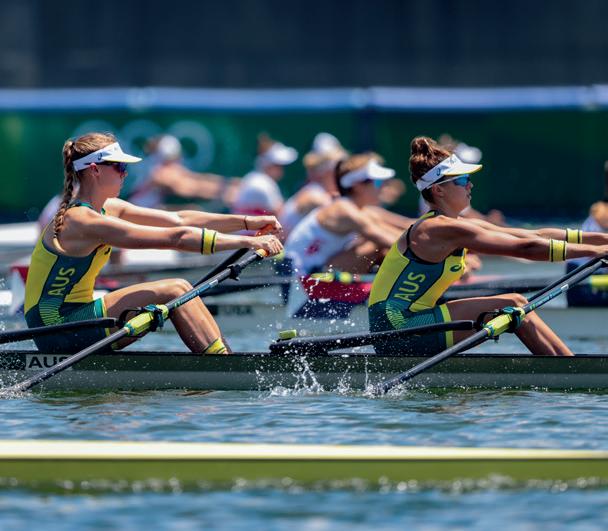

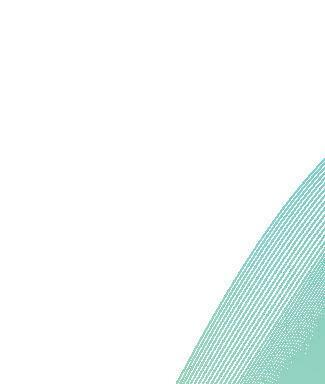
The Men’s Eight of Nick Lavery, Jack O’Brien, Josh Booth, Simon Keenan, Nick Purnell, Tim Masters, Angus Dawson, Angus Widdicombe and cox Stuart Sim, were the first crew to race for Australia on Day One, due to a change in the schedule resulting from a forecast of adverse weather. Facing rowing powerhouses in their heat including World Champions Germany and the USA as well as Romania, the fast race was dominated early by the American and German crews, with Australia finishing fourth behind Romania to proceed to the repechage. The crew secured their start in the A-Final with a fourth-place finish in the repechage. It was another stacked field in the Final with Australia drawing lane six against the USA, New Zealand, Germany, the Netherlands and Great Britain. It was a fast race with the Australian crew behind at the start. Unable to make up the time or speed throughout the race they finished sixth overall.
WOMEN’S EIGHT
The Women’s Eight of Genevieve Horton, Olympia Aldersey, Bronwyn Cox, Giorgia Patten, Sarah Hawe, Georgina Rowe, Katrina Werry, Molly Goodman and cox James Rook, faced Romania and USA in their heat, needing to finish first to directly advance to the Final. Despite being fast off the blocks, the Australians came in third behind the USA who claimed first ahead of Romania. The women finished their repechage in fourth and faced a tough field of Canada, New Zealand, USA, Romania and China in the Final. Looking to finish on a high, the crew were fast from the start, setting a strong pace and rhythm to keep up with the Canadian boat who took an early lead. Placed second after the first 500-metres and only 0.66 seconds off the pace, the Australians fought hard to hold their position, but the opposition were too strong and after fading in the second half of the race, the Australians finished fifth overall.
MEN’S COXLESS PAIR
Sam Hardy and Joshua Hicks were favourites going into their heat and the pair was fast out of the blocks taking an early lead and maintaining consistent speed to take first place. A fourth place in the Semi-Final relegated the pair to the B-Final where they faced opposition from crews from France, Italy, New Zealand, Belarus and the Netherlands. They quickly established a solid rhythm and were holding second position at the first 500-metre mark, but they were unable to catch the Netherlands who placed first. The Australians ended the B-Final in fourth behind Belarus and France which ultimately placed the pair 10th overall.
WOMEN’S COXLESS PAIR
Jessica Morrison OAM and Annabelle McIntyre OAM finished first in their heat, racing off against the reigning Olympic Gold Medallist Helen Glover and World Champion Polly Swann of Great Britain, as well as experienced crews from the Russian Olympic Committee and China. The pair started strong, holding pace throughout the race to progress to the Semi-Final. Needing to finish in the top three to advance to the A-Final, the Australian pair started their Semi-Final having been crowned Olympic Champions in the Women’s Coxless Four just two hours earlier. Despite a very close race, they crossed the line in fourth and had to settle for the B-Final, which they ultimately won to finish their Olympic campaign in seventh position.
WOMEN’S DOUBLE SCULL
The crew of young Olympic debutants Amanda Bateman and Tara Rigney advanced to the Semi-Final after they snapped up third place in their heat. They were fast out of the blocks and held their own against the more experienced crews from Lithuania and Germany. With the Netherlands pulling ahead of Australia and Germany to battle with Lithuania for the win, the Aussies fended off a late charge from Germany to finish third. In their Semi-Final, the young combination came out strong and were in the mix for the first half of the race, jostling with Canada, USA, the Netherlands and France for a spot in the Final. As the crews hit the final 500-metres, it was the Netherlands, Canada and USA in front with France and Australia chasing down the leaders, but the crews ran out of water and Australia crossed the line in fifth place. The crew went on to win their B-Final and record an overall result of seventh for their first Olympic appearance.
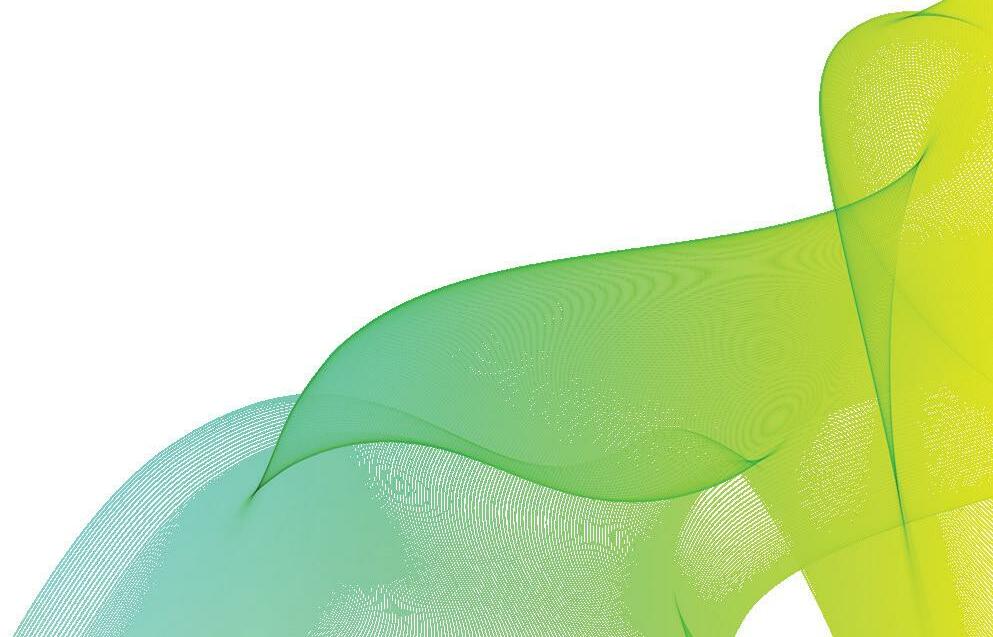
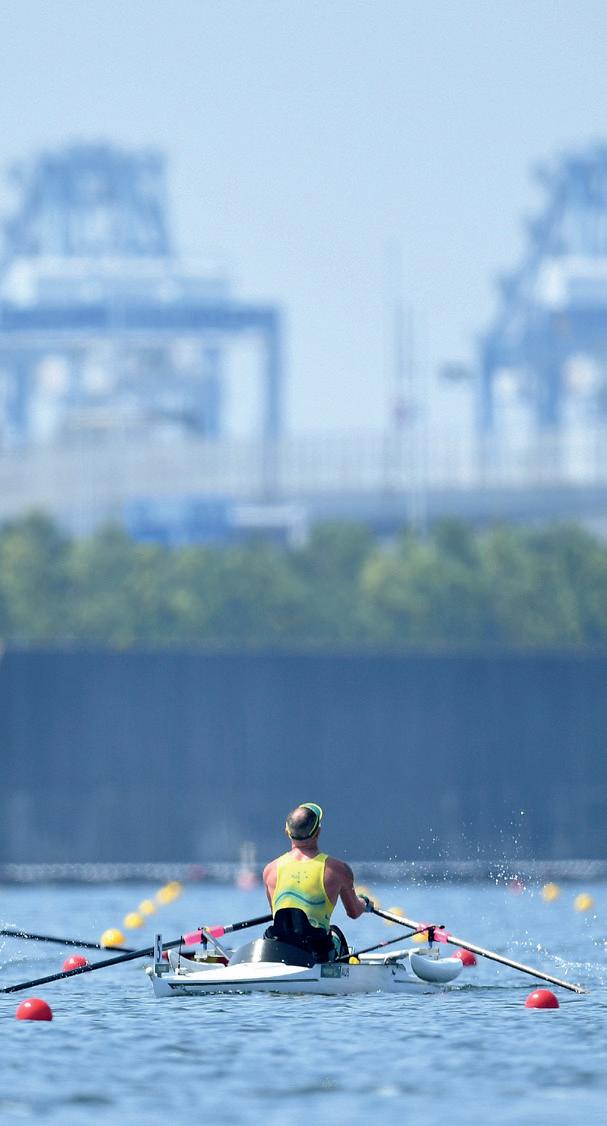
Four-time Paralympian Kathryn Ross and Paralympic debutant Simon Albury were drawn in lane four and faced reigning World Champions Great Britain in their heat. They finished the race in third position and were forced into the repechage where they again finished third. The time they clocked would have seen Ross and Albury on the podium in any of the PR2 Mix2x World Championships events held over the 2000-metre distance. Determined to end their regatta on a high, the crew stormed home in the B-Final and finished the race in first position, placing them seventh overall.
PR3 MIXED COXED FOUR
The crew of Nikki Ayers, Alexandra Viney, James Talbot and Thomas Birtwhistle and Renae Domaschenz started their heat from lane five with their biggest challenge coming from rivals USA who got off to a fast start. The USA continued to increase their lead over Australia who finished their heat in second position. In the repechage, Australia and Italy remained incredibly close in the early stages of the race with Italy just having a nose over Australia. Coming into the final sprint and with a position in the A-Final on the line, Australia picked up the pace and gave it their all to cross the line in first position. The PR3 Mixed Coxed Four came fourth in their Final, beaten by a dominant Great Britain, a strong USA and a fast-finishing France.
PR1 MEN’S SINGLE SCULL - SILVER
Erik Horrie OAM raced the repechage after finishing second to Brazilian Rene Pereira in their heat. The two duelled through the middle of the race before Pereira gained a slight edge over Horrie. He was challenged by Shmuel Daniel of Israel in the early stages of the repechage but advanced to the A-Final with a win. The Rio 2016 Gold Medallist, Roman Polianskyi, went into the A-Final as the favourite and led from the outset to claim Gold. The chase was on with Horrie, Pereira and Spain’s Javier Reja Munoz battling for minor placings between the 500-metre mark and the 1500-metre mark before Horrie finally broke free of the pack. In a tough head wind, Horrie produced a patient but tactically strong race, holding his line and trusting that he had the power in the end to pull ahead to take his third Paralympic Silver Medal in this boat class. In the Final, China and Poland established a strong lead ahead of the field. The Aussies maintained fifth position for the first 1500-metres, it was their composure and boat speed in tough conditions that pushed them through to take the Bronze, ahead of crews from Italy, Germany and the Netherlands.
